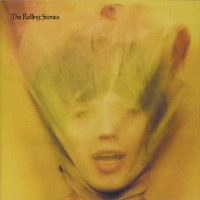
For decades, Goats Head Soup endured many critics’ and fans’ slights and even dismissals for not being as earth-shaking as its canonical predecessor, Exile On Main St. But in recent years, a re-evaluation of Goats Head Soup‘s merits has gained traction, and its reputation has burgeoned among people with better-than-average taste in rock music (if I may be so bold). The turning point for me was when I found myself on New York psych-rockers Mercury Rev’s tour bus in Ohio on one of their mid-’90s tours, and they were listening to Goats Head Soup. If these musicians whom I admired like hell were into this album, maybe I needed to give it a closer listen. I’m very glad I did.
GHS boasts some of the Stones’ most popular and overexposed tunes (“Angie,” “Doo Doo Doo Doo Doo [Heartbreaker]”), some of their greatest deep cuts (“Coming Down Again,” “Winter,” “Can You Hear The Music”), and a couple of country-rock burners (“100 Years Ago,” “Silver Train”; that these London blokes are so adept at country stylings has always puzzled and pleased me). There’s only one real dud: the rarely spoken-of, standard-issue blues-rocker “Hide Your Love.” Everything else deservers heavy rotation in your annual Rolling Stones diet.
“Dancing With Mr. D” is such a great sleazy opener, so potent and sinister, although it kind of verges on self-parody by 1973. No matter. It’s the sound of a band whose members know they’re the baddest in the world, and that bravado manifests itself to the fullest in this grinding, midtempo rocker. “100 Years Ago” toggles between country-rock and R&B, with a slick raveup at the end in which guitarist Mick Taylor reels off a mercurial, wah-wah-intensive solo which reinforces the idea that losing him seriously weakened the Stones.
On “Coming Down Again,” Keith Richards sings in his most sincere, vulnerable, and poignant voice in a song that ranks among the Stones’ greatest ballads, up there with “Wild Horses” and “Sway.” This Gram Parsons-esque country-rock weeper exudes a junkie fragility that’s tragically beautiful. “Coming down again/Where are all my friends?” (with Jagger following in sotto voce “Sky fall down again”) is a concise summary of a drug addict’s situation. You can have “Happy” and “Before They Make Me Run”; I’m sticking with “Coming Down Again.”
“Doo Doo Doo Doo Doo (Heartbreaker)” is a harrowing tale of drug addiction and violence set to menacing, flinty rock, augmented by horns of magnificently triumphal robustness, as if they’re trying to lift your spirits from the morbid NYC tale Jagger’s relating. You’ve heard “Angie,” a gorgeous, tender ballad about a dissolving romance with bravura piano performance by Nicky Hopkins, about a hundred times too many. No getting around it: The heart-string-plucking allure of the Stones’ most Elton John-like moment has been eroded by thousands of listens over the decades, but still, respect is due.
The three songs that close out GHS are phenomenal. The Van Morrison-esque ballad “Winter” has beaucoup soul and enough wistfulness to melt the coldest heart. Richards sat out this one, while Mick Taylor contributed much to the sublime music, but the Glimmer Twins shafted him on the credits. Not cool.
But let’s not get bogged down in petty administrative decisions. Because “Can You Hear The Music” follows. While few fans rate it highly in the Stones’ canon, I place this paean to the metaphysical power of music near the top. It’s at once one of the band’s funkiest and most psychedelic songs, and its outlier status is solidified by Jim Horn’s serene flute and percussion contributions from the great synth composer Nik “Pascal” Raicevic and CAN/Traffic member Rebop Kwaku Bah. This thing sways and breezes from an exotic place where the Stones rarely ventured, and it features some of their sickest guitar tones. It almost sounds like a tribute to Brian Jones’ Master Musicians Of Jajouka collab in Morocco. “When you hear the music/trouble disappear” is a mantra worth storing in your memory banks forever.
After the lofty, exotic splendor of “Can You Hear The Music,” “Star Star” slams you back down to earth and the bedroom with a raunchy Chuck Berry homage that gained notoriety for its profane chorus and its tumescent tribute to a hall-of-fame groupie who made Ali McGraw angry “for giving head to Steve McQueen.” Leave it to the Stones to follow perhaps their most spiritual composition with possibly their nastiest. If that sequencing was intentional, I tip my hat to Mick and Keef. You gotta love that kind of perversity.
So, yeah, Goats Head Soup has gotten a bad rap by certain establishment critics and wrongheaded fans, but it possesses at least five undeniable classic cuts. The Stones may have been buckling under the stresses of rock-star excess and unrealistic expectations in the early-’70s wake of Exile, but they somehow fought through the haze to create a strong, varied record that’s earned its status as an underdog favorite in their massive catalog. -Buckley Mayfield



Nice review of an album that’s finally getting its due. I always thought the critical hostility might have been some poorly disguised homophobia by guys freaked out by the androgynous Jagger album cover. And rumors of dalliances with Bowie.